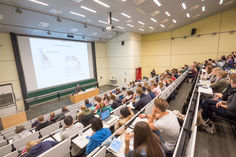Exome-wide analysis based on genome sequencing*
Sample material required
5-7 ml EDTA blood, for small children a small amount of blood (1-3 ml) from
or approx. 5 µg extracted DNA of the patient and his/her parents is sufficient
Sample dispatch
EDTA blood samples or extracted DNA can be sent unrefrigerated by normal overnight post.
Please send the samples to the following address:
Heidelberg University Hospital
Institute of Human Genetics
Laboratory for Molecular Genetic Diagnostics
Im Neuenheimer Feld 366
69120 Heidelberg
Sample labelling
Please label each sample container clearly and legibly with the surname, first name and date of birth of the patient, his/her mother and his/her father and use our request forms.
The request forms are structured in such a way that they contain all the necessary information about the patient, including the patient's declaration of consent for the test order. Please enclose a separate declaration of consent for each parent.
In order to be able to better assess the variants with regard to their significance, please provide us with a doctor's letter with clinical details of the patient. If possible, please provide HPO (Human Phenotype Onthology) terms or a brief summary of the clinical features.
Please complete the request forms carefully to avoid unnecessary enquiries and please understand that we cannot accept unlabelled sample containers.
Please bear in mind that we can only carry out this genetic analysis if we have the written consent of the patient and his/her parents.
Further information
Examination method:
Next generation sequencing (NGS) technology can be used to detect changes in genetic material. Genome diagnostics involves sequencing the genome (whole genome sequencing). The analysis is based on an exome, i.e. the protein-coding regions of the genome. Whole genome libraries are produced from genomic DNA, which are then analysed in a high-throughput process on an Illumina NovaSeq6000/NovaSeqX sequencer and the data obtained is evaluated.
Note:
In order to analyse the data effectively, we require as detailed a description as possible of the patient's clinical picture. It may be necessary to analyse the parents for a final assessment of the sequence variants detected in the index patient. We therefore ask you to send us material from the parents at the same time.
Processing time:
approx. 2-5 months depending on urgency and sample volume
Contact person
PD Dr. rer. nat. Katrin Hinderhofer
Fachhumangenetikerin (GfH)
Clinical Laboratory Geneticist (EBMG)
* non-accredited examination systems
![[Translate to English:] [Translate to English:]](/fileadmin/_processed_/8/2/csm_20131204_Beratung_035_a396c6c6e5.jpg)
![[Translate to English:] [Translate to English:]](/fileadmin/_processed_/a/0/csm_20170627_PflegeOrtho_001_fb912471fa.jpg)
![[Translate to English:] [Translate to English:]](/fileadmin/_processed_/f/c/csm_20170215_LaborOMZ_155_c0169c0898.jpg)
![[Translate to English:] [Translate to English:]](/fileadmin/_processed_/2/c/csm_20180523_Labor_139_6ebb9a0a1b.jpg)

